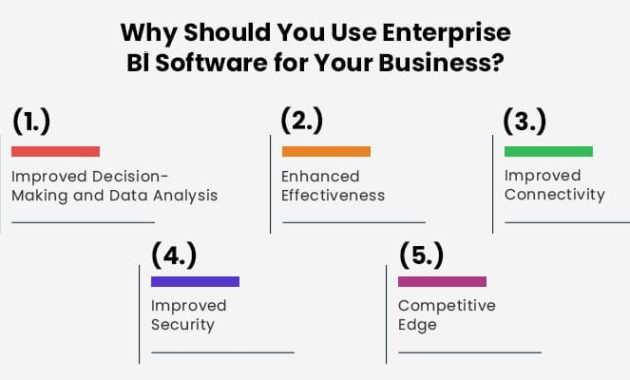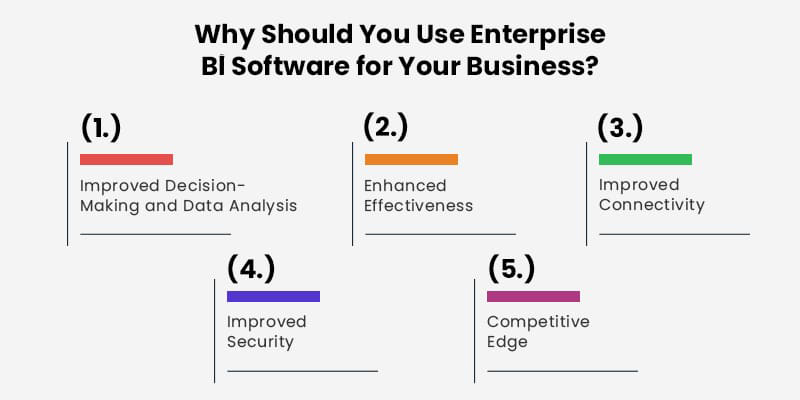
Why You Need Business Intelligence Software in 2025: Navigating the Data-Driven Future
The year is 2025. Businesses, large and small, are awash in data. The competitive landscape has become a battlefield, and the weapons of choice are insights. To survive, companies must wield business intelligence software. This article explores why business intelligence (BI) software is not just beneficial but essential in 2025.
The proliferation of data has reached unprecedented levels. Every click, transaction, and interaction generates information. This data, if harnessed effectively, offers a treasure trove of opportunities. However, without the right tools, it becomes an overwhelming burden. Business intelligence software transforms raw data into actionable knowledge. It empowers businesses to make informed decisions, optimize operations, and gain a crucial edge.
The Data Deluge and the Need for Speed
The volume, velocity, and variety of data continue to increase. This is the era of big data. Traditional methods of data analysis are simply inadequate. Spreadsheets and manual reporting processes are too slow. They cannot keep pace with the rapid influx of information. Business intelligence software offers automated data processing. It provides real-time insights. This allows businesses to react quickly to market changes and emerging trends.
Consider the retail sector. Inventory management, customer behavior analysis, and sales forecasting are all critical. BI software can analyze point-of-sale data, website traffic, and social media activity. This provides a comprehensive view of the business. It allows retailers to optimize their product offerings, pricing strategies, and marketing campaigns. This leads to increased sales and improved customer satisfaction. This is just one example of how crucial **business intelligence software** is becoming.
Enhanced Decision-Making Capabilities
One of the primary benefits of **business intelligence software** is its ability to enhance decision-making. The software allows businesses to move beyond gut feelings and hunches. It replaces them with data-driven insights. This reduces risk and increases the likelihood of success. Decision-makers can access dashboards and reports. These visualizations provide a clear and concise understanding of key performance indicators (KPIs).
These dashboards highlight trends, patterns, and anomalies. This information empowers executives to make strategic decisions with confidence. They can identify areas for improvement, allocate resources effectively, and anticipate future challenges. This is especially important in 2025. The business environment will be more competitive than ever. The need for accurate and timely information will be paramount.
Improved Operational Efficiency
Business intelligence software is not just for executives. It benefits all levels of an organization. By automating data analysis and reporting, BI software streamlines operations. It frees up employees from tedious manual tasks. This allows them to focus on more strategic initiatives.
For example, in manufacturing, BI software can monitor production processes. It identifies bottlenecks and inefficiencies. This leads to reduced downtime and increased output. In the finance department, it can automate financial reporting. This ensures accuracy and compliance. In the customer service department, it can analyze customer interactions. This improves customer satisfaction and reduces churn. The ability to optimize operational efficiency is a key driver of **business intelligence software** adoption.
Gaining a Competitive Advantage
In 2025, the businesses that thrive will be those that embrace data. They will use it to their advantage. **Business intelligence software** is the key to unlocking this competitive advantage. By analyzing market trends, customer preferences, and competitor activities, businesses can identify new opportunities. They can also stay ahead of the curve. This allows them to develop innovative products and services. It also helps them to better target their marketing efforts.
For instance, a company can use BI software to analyze customer feedback from social media. They can then tailor their product development accordingly. They can also identify emerging market segments. This provides a first-mover advantage. The ability to adapt quickly and respond to changes is critical. **Business intelligence software** provides the agility needed to succeed in a dynamic market.
Predictive Analytics and Future Forecasting
Beyond historical reporting, modern **business intelligence software** incorporates predictive analytics. This allows businesses to forecast future trends. They can anticipate market changes. They can also make proactive decisions. Predictive analytics uses statistical algorithms and machine learning. It analyzes historical data to identify patterns and make predictions.
For example, a retail company can use predictive analytics to forecast sales for the upcoming season. They can then adjust their inventory levels accordingly. This minimizes the risk of overstocking or stockouts. In the healthcare industry, it can predict patient readmission rates. This allows hospitals to implement preventative measures. This improves patient outcomes and reduces costs. The ability to anticipate the future is a significant advantage. **Business intelligence software** offers this capability in 2025.
Integration and Collaboration
Modern **business intelligence software** seamlessly integrates with other business systems. This includes CRM, ERP, and marketing automation platforms. This integration creates a unified view of data. It breaks down data silos. It also promotes collaboration across departments.
Employees can access the same data. They can work together to solve problems and achieve common goals. This improves communication and coordination. It leads to better decision-making. The integration of data is crucial. It unlocks the full potential of **business intelligence software**.
Data Security and Compliance
As data becomes increasingly valuable, data security is paramount. Reputable **business intelligence software** providers prioritize data security. They implement robust security measures to protect sensitive information. This includes encryption, access controls, and regular security audits.
Compliance with data privacy regulations, such as GDPR and CCPA, is also crucial. **Business intelligence software** can help businesses comply with these regulations. It provides tools for data governance and privacy management. Ensuring data security and compliance is non-negotiable in 2025.
The Changing Landscape of Business
The business world is constantly evolving. New technologies and trends emerge. The successful businesses will be those that adapt quickly. They will leverage data to their advantage. **Business intelligence software** is at the forefront of this transformation. It will empower businesses to thrive in the future.
The rise of artificial intelligence (AI) and machine learning (ML) will further transform the BI landscape. AI-powered BI tools can automate data analysis. They can also provide even deeper insights. This will allow businesses to make even more informed decisions. The future of **business intelligence software** is bright.
Choosing the Right Business Intelligence Software
Selecting the right **business intelligence software** is essential. Businesses should consider their specific needs. They should evaluate different vendors. They should also compare features and pricing. Key factors to consider include:
- Ease of use: The software should be user-friendly and intuitive.
- Scalability: It should be able to handle growing data volumes.
- Integration: It should integrate with existing systems.
- Reporting and visualization: It should provide clear and concise reports.
- Mobile access: It should be accessible on mobile devices.
- Data security: It should have robust security features.
Investing in the right **business intelligence software** is an investment in the future. It is an investment in success.
Conclusion: The Imperative of Business Intelligence in 2025
In conclusion, the need for **business intelligence software** in 2025 is undeniable. The volume of data is increasing exponentially. The competitive landscape is becoming more intense. Businesses that embrace data and use it to their advantage will thrive. **Business intelligence software** is the tool that empowers them to do so. It offers enhanced decision-making, improved operational efficiency, and a crucial competitive advantage. The future is data-driven, and **business intelligence software** is the key to unlocking that future. Don’t be left behind. Embrace **business intelligence software** today.
[See also: Related Article Titles]

